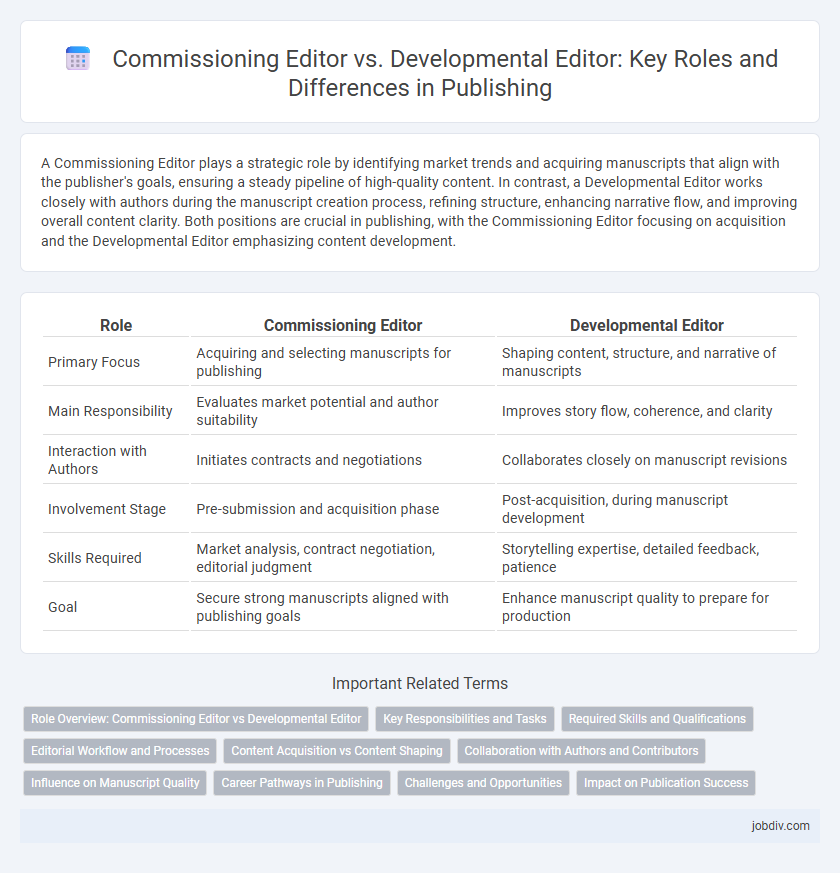A Commissioning Editor plays a strategic role by identifying market trends and acquiring manuscripts that align with the publisher's goals, ensuring a steady pipeline of high-quality content. In contrast, a Developmental Editor works closely with authors during the manuscript creation process, refining structure, enhancing narrative flow, and improving overall content clarity. Both positions are crucial in publishing, with the Commissioning Editor focusing on acquisition and the Developmental Editor emphasizing content development.
Table of Comparison
| Role | Commissioning Editor | Developmental Editor |
|---|---|---|
| Primary Focus | Acquiring and selecting manuscripts for publishing | Shaping content, structure, and narrative of manuscripts |
| Main Responsibility | Evaluates market potential and author suitability | Improves story flow, coherence, and clarity |
| Interaction with Authors | Initiates contracts and negotiations | Collaborates closely on manuscript revisions |
| Involvement Stage | Pre-submission and acquisition phase | Post-acquisition, during manuscript development |
| Skills Required | Market analysis, contract negotiation, editorial judgment | Storytelling expertise, detailed feedback, patience |
| Goal | Secure strong manuscripts aligned with publishing goals | Enhance manuscript quality to prepare for production |
Role Overview: Commissioning Editor vs Developmental Editor
A Commissioning Editor identifies and acquires new content ideas, negotiating contracts and managing author relationships to build a publishing portfolio. A Developmental Editor works closely with authors to shape the manuscript's structure, content, and flow, enhancing overall quality and marketability. Both roles are crucial in the publishing process but focus on different stages: acquisition versus manuscript refinement.
Key Responsibilities and Tasks
A Commissioning Editor oversees acquiring manuscripts, evaluating proposals, and approving projects aligned with market demand and publisher goals. Developmental Editors focus on manuscript structure, content refinement, and narrative improvement, working closely with authors to enhance clarity, flow, and overall quality. Key tasks for Commissioning Editors include market analysis and contract negotiation, while Developmental Editors prioritize detailed manuscript editing and author collaboration.
Required Skills and Qualifications
A commissioning editor must possess strong market analysis skills, excellent communication abilities, and a deep understanding of publishing trends to identify promising projects and negotiate contracts effectively. In contrast, a developmental editor requires expertise in manuscript evaluation, structural editing, and a keen eye for narrative coherence to guide authors through substantial content improvements. Both roles demand exceptional literary judgment and project management experience, but the commissioning editor leans toward business acumen, while the developmental editor emphasizes editorial craftsmanship.
Editorial Workflow and Processes
A Commissioning Editor primarily identifies and acquires new content, guiding authors through the initial stages of the publishing process by evaluating proposals and negotiating contracts. In contrast, a Developmental Editor focuses on shaping the manuscript's structure, enhancing narrative flow, and ensuring clarity during the substantive editing phase. Both roles collaborate closely within the editorial workflow to balance market demands with content quality and coherence.
Content Acquisition vs Content Shaping
Commissioning Editors focus on content acquisition by identifying market trends and selecting manuscripts that align with a publisher's strategic goals. Developmental Editors concentrate on content shaping, working closely with authors to enhance narrative structure, clarity, and overall impact. Both roles are essential in transforming raw ideas into polished, market-ready publications.
Collaboration with Authors and Contributors
A Commissioning Editor collaborates closely with authors and contributors to identify promising projects and secure publishing rights, guiding initial manuscript proposals and aligning them with market demands. A Developmental Editor works directly with authors during the manuscript creation process, providing in-depth feedback on structure, content, and style to enhance clarity and coherence. Both roles require effective communication and partnership to ensure the publication meets editorial standards and audience expectations.
Influence on Manuscript Quality
A Commissioning Editor shapes manuscript quality by selecting works that align with market trends and publisher goals, ensuring commercial viability and audience appeal. A Developmental Editor directly enhances manuscript quality through in-depth feedback on structure, content, and narrative coherence, guiding the author to refine ideas and improve readability. Together, their roles influence the manuscript's potential success by combining strategic selection with detailed content development.
Career Pathways in Publishing
Commissioning editors focus on acquiring new titles and cultivating author relationships, shaping the publishing catalogue through market analysis and trend identification. Developmental editors specialize in refining manuscript content and structure, working closely with authors to enhance storytelling and coherence before publication. Career pathways in publishing often see professionals transition between these roles to gain comprehensive editorial expertise and advance to senior editorial or managerial positions.
Challenges and Opportunities
Commissioning editors face the challenge of identifying market trends and securing rights to promising manuscripts while balancing budget constraints and author expectations. Developmental editors encounter opportunities to deeply influence a manuscript's structure and content, enhancing clarity and coherence, but must navigate potential resistance from authors during substantial revisions. Both roles demand strong communication skills and industry insight to successfully guide a book from concept to publication.
Impact on Publication Success
Commissioning Editors play a critical role in shaping a publication's direction by selecting high-potential projects and securing rights that align with market demand, directly influencing commercial success and audience reach. Developmental Editors enhance a manuscript's quality through structural guidance and content refinement, ensuring clarity, coherence, and engagement that increase reader satisfaction and critical acclaim. Together, these editorial roles synergize to optimize both market viability and editorial excellence, driving overall publication success.
Commissioning Editor vs Developmental Editor Infographic

 jobdiv.com
jobdiv.com